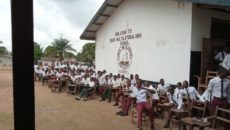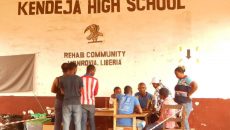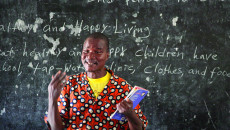Since the president declared the Liberian education system a mess, many solutions have been put forward by government educators and education stakeholders to improve it.
The Ministry of Education, under its new management team, has come up with a rescue plan, an agenda for transformation, called the Getting to Best Education Sector Plan.
Some of the solutions proffered in the plan include training for teachers, hiring more qualified teachers, increasing teacher salaries, building teacher quarters in rural areas, supplying schools with needed learning materials, and regular and robust supervision.
The government has been working on some of these issues while others are still hanging out on the ‘waiting list.’
Today, a number of the ‘mess’ the president was trying to articulate still remains. We are still faced with mass failures on public tests, our high school and college graduates are said to be unable to write effectively and Liberian students in general, are not reading at their grade levels.
This gives rise to the generalization that Liberians don’t read and don’t write.
To remedy the situation, the government has set up programs to improve the education system by encouraging more qualified people to the teaching profession. The government has also been building schools, and teachers are being trained on a regular basis. Books and other learning materials are being supplied freely to public schools across the country.
But with all the things being done, we hear little or nothing about the library, the ‘free school’ where the largest variety of books are readily available for reading.
The silence seems to say that the library is nowhere near the priority of the government with respect to improving education in Liberia.
The lack of libraries, and thus the lack of diverse reading materials, is not only affecting our educational system but also our national literacy level. It is affecting our way of life, especially access to employment opportunities that require educated and literate people.
This also has impact on our access to information and how we communicate. The lack of libraries effectively promotes our tendency of consuming rumors rather than seeking factual information.
In his book, Library Manual, Krishan Kumar says when asked to inspect a school, he would base his report of his inspection in two areas: the school library and laboratory.
Just as books are important for teachers to teach and for the students to learn, so is the library important to the school. And just as a good school aims to prepare people to perform their roles in society effectively, a good school library also aims to drive the learning process of the school in meeting its literacy and learning goals by being a focus of educational excellence.
This is to say, no school can meet its goal of providing quality education to its students without having a good and efficient library.
The school library provides many services including the materials teachers needed to improve their instruction. Students also benefit from a range of reading materials to meet their reading needs and their search for information. It also provides students a venue to study and do their homework and it can be a meeting place for the exchange of ideas.
The school library, with its wide variety of interesting and relevant reading materials, makes students independent learners (which most of our students are not), creating in them love for reading by being regular users of a place where learning continues to be happening.
Research shows that students that use the library regularly do better in their studies. Additionally, schools with well-equipped and easily accessible libraries have students that are well prepared to learn.
A good school library is a hub of activities for a school, with a good school librarian implementing activities like story hours, student reading clubs, read aloud sessions, spelling bees, debates, and dramas. Indeed, it can be a focal point for other educational experiences that will support the learning process.
This article was originally published in Beyond the Classroom, a newsletter published by the We-Care Foundation.
Featured photo courtesy of Kelley Lynch



